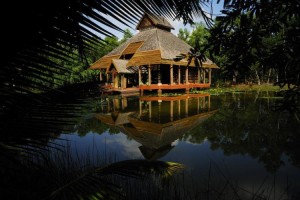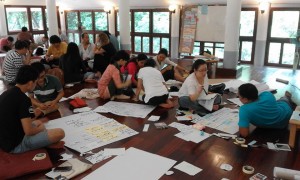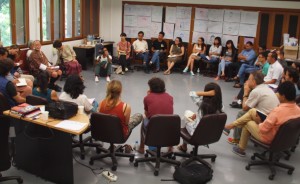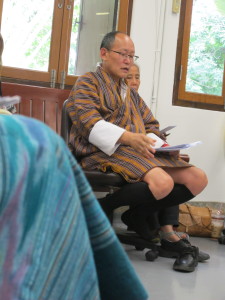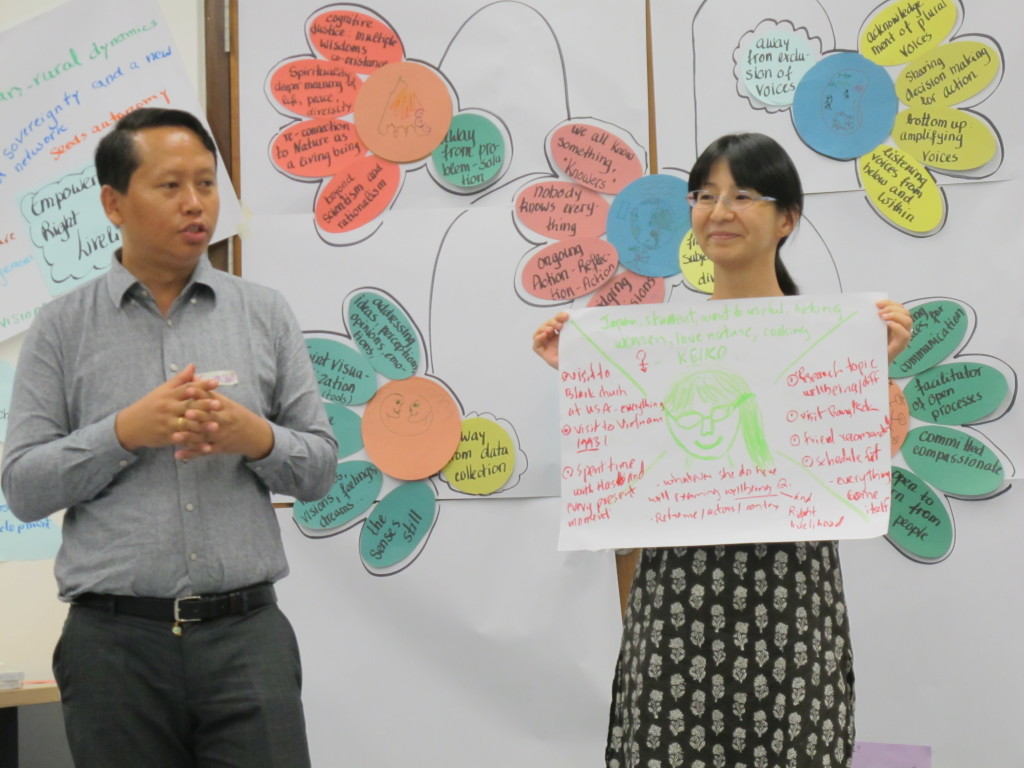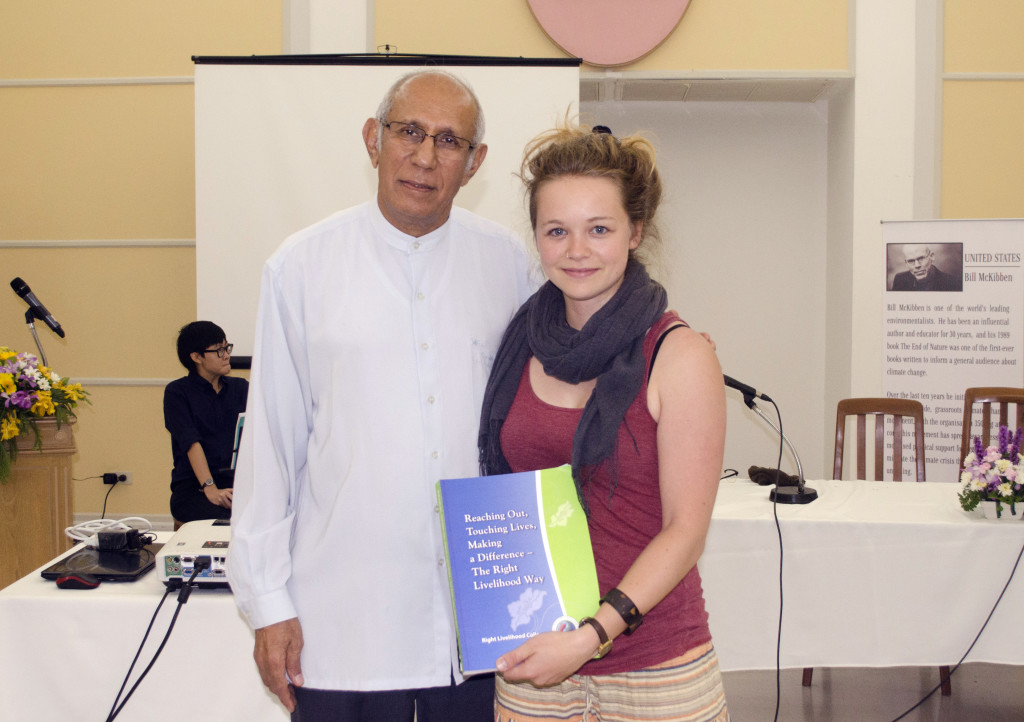Entschuldigung, leider können wir diesen Artikel nur auf Englisch zur Verfügung stellen!
Exploring the roots of Right Livelihood
A summary of Chulalongkorn University Right Livelihood Summer School 2015, CURLS.
Right Livelihood is one pillar of Buddha´s Noble Eightfold path. It means to live in a way that doesn´t harm any other living being, ideally one that is ethically positive. Consequently, there is not the one and only way to Right Livelihood, but many different ones.
This summer, around 20 activists, changemakers and visionaries came together to learn from each other about their ideas of Right Livelihood. The participants came mostly from South (East) Asia, some from Europe and a couple from the American continent. The Youth Future Project, youth association of the Right Livelihood foundation, was also represented with one member. Thematically, CURLS was embedded in the fields of food sovereignty, sustainable and organic agriculture and the urban-rural divide, accompanied by a vast variety of resource persons and some Right Livelihood Award laureates, such as Anwar Fazal, Bill McKibben and Sulak Sivaraksa.
The first days of the summer school was about getting to know the group and Bangkok, introducing the topics, sharing experiences and discussing challenges and perspectives for sustainable transformation. The group then moved to the Ashram Wongsanit, a Buddhist eco-village close to Bangkok, where it was all about Participatory Action Research (PAR) – tools for anthropological field work and community work breaking with the conventional paradigms of research and facilitating empowerment. PAR dissolves the classical subject- object- divide, creates eye-level contact and regards every knowledge as equal and every human being as an equally valuable “knower”. With these tools in mind, the group divided into four sub-groups and set off for a field trip. In these communities and villages the participants not only practiced this methodology, but also learned about different ways of Right Livelihood, Self-sufficiency, traditional knowledge, organic agriculture in Thailand and Buddhist values.
After the return to Bangkok, the participants designed and created an exhibition with their experiences from the field work trip and created their own Right Livelihood Initiative, applying the new tools, skills and impressions to their own work.
The summer school therefore came to an end after two weeks, but at the same time build the foundation for further activism: apart from the numerous initiatives that evolved out of CURLS, plans for the summer school 2016 have already been made, which will probably partly take place in Bhutan!
CURLS was indeed a place of flourishing and fruition, spreading the idea of Right Livelihood a little further. It´s like a seed that every participant took home and that will hopefully grow towards the sun, give shade and nourish the soil underneath.
A warm and honest “Thank You” to the whole organising team of CURLS and especially to Timmi Tillmann, Maruja Salas, Hans and Wallapa van Willenswaard and all the other resource persons who enabled this summer school.
–Norina Möller, Youth Future Project–
Neoliberalism and the food system
„You hum something, a tone or a sound and the rest of the group is following you!“
A sound is coming from one corner, gradually the rest of the group adopts this sound. It becomes louder and louder, like a swarm of busy bees flying towards you. The sound stops and after a while also the last imitator fell silent. A new tone is hummed, everyone listens carefully, searches for the right tone and joins in.
In the end we were even able to hum/ sing songs and melodies by simply following the improvised tune of the person who is leading the song.
This morning we spend an hour that we only dedicated to our voice. Where does our voice come from, how does it feel like, can we follow a sound from another person, how can we modulate our voice. Not only was this a perfect start into the day, it is also something very important when you are an activist who wants to promote change. Alok Ulfat, who is a trainer for theatre, expression, voice and appearance from India holds one hour of “mind & body movement”- workshops every morning. He is convinced that there is a voice in every person that has the right need to be heard and especially for a group of changemakers it is of utter importance to bring the message across to other people, to speak out loud and to use emotional and convincing body language.
After this very active start in the day we dived into the matter of political economy, the concept of neo-liberalism and the impacts of the agenda on South East Asia. The short lecture, followed by a lively discussion, was held by Surat Horachaikul who is an Assistant Professor at the Faculty of Political Science at Chulalongkorn University. After a journey starting from A. Smith and J. Locke, via role of the state in neoliberalism and a discussion on populism, we ended up talking about possible paths out of the neoliberal agenda. What´s the role of the individual in this process? What´s the role of companies? Maybe this system is too adaptive and powerful that there won´t ever be any change? No, says Surat Horachaikul. There is hope! The small steps towards Right Livelihood each of us goes every day, from buying organic food, to campaigning have an impact on the system that is not to be underestimated. And as long as we live in a system that is shaped by supply and demand, we can have an impact on that “demand” side. But can we really change a company that is already deeply embedded in the current system, thinking about increasing the profit margin rather than mother earth? The discussion reached long into the break…
The break was followed by a presentation by Ong Kung Wai, board member of IFOAM (International Federation of Organic Agriculture Movements) who focussed more on the economical, systemic and technical arguments in favour of a shift toward organic agriculture.
The afternoon was all about food systems and supply chains where we used the method “World Café” to find out more about what food means to us, why we think the current food system is not sustainable and how we can work towards a more sustainable way of producing and consuming food.
A brief summary of the discussions and outcomes is soon to follow but one thing can already be said: for every participant producing, cooking and consuming food is something precious and the current system disconnects us from the roots of the food system. Fast Food, Take Away, far distance between production and consumption and the destruction of soil (and many more of course) are all aspects of the food system that create an imbalance and disharmony. We need to find ways to appreciate food again, to take time to cook properly, we need to support local markets and to see food not only as a means to appease one´s hunger but as a gift and our basis of life. If we keep on destroying traditional knowledge of farming, if we keep on spraying chemicals on our vegetables and if we keep on putting profit over people and the environment we will eventually not only harm humankind but damage the whole environment.
I open the windows to let in some fresh air and get hit by a wall. I immediately decide to shut the windows again. Air conditioning? Really? I turn it on and it´s a relief. I still need to adjust to the completely new climate, everything smells different, looks different and is organized in a different way. Speaking of differences, since today I also know that in Thailand you should avoid pinpointing or stepping with your foot at or on something, as the foot is regarded something unclean and dirty (in fact my feet were quite dirty..). So when I wanted to show another participant something on a poster that was lying on the floor and I used my foot to point towards the issue, I raised some indignant looks. First cultural brick dropped.
Since Friday a group of young adults is gathering at Chulalongkorn University in Bangkok. They are all participants of the Chulalongkorn Right Livelihood Summer School (CURLS), a joint event of the Right Livelihood Colleges (RLC), the Chulalongkorn University, the Wellbeing Studies Programme and several other organisations which is taking place in and around Bangkok for the next two weeks. The aim of the summer school is to get familiar with the concepts of Right Livelihood, Participatory Action Research and link this to current urban and rural food challenges. The participants´ backgrounds and interests are diverse and range from work with single women in India to Ecotourism in Vietnam to environmental education with Buddhist values in Thailand. We have representatives from the Royal University of Bhutan and PhD students from the States. I am representing the Youth Future Project, the youth association of the RLAF and I will mainly be responsible for feeding this blog.
(In the Picture, second from the left- Vice President of Royal University of Buthan and participants)
After a rather official first day with introductory key note speeches, we got into a familiar working atmosphere today. The main focus was on introducing the concept of participatory action research and to listen to some greetings from Right Livelihood Award Laureates. With interactive and creative methods the participants were then asked to first get to know each other and then present their own field of study/ work and their visionary initiative for right livelihood action that will set the base line for the next days. At the end of this summer school we will come back to these initiatives and ideas and see how we can turn them into action. The first attempt of visionary work lay an inspiring and hopefully fruitful foundation for the participants of the summer school.
During the next week we will try and make as many voices from the Summer School get heard as possible. Through interviews or articles by participants we hope to let everyone become a part of this amazing process full of inspiration and hope, participation and action, reflection and solution seeking.
(Anwar Fazal (RLA Laureate) and Norina Möller (YFP))

